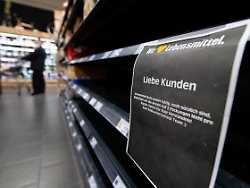Pandemic, war, inflation
Germany is getting poorer
04/17/2022, 08:01 am
First the pandemic, then the war. Prices are rising, gaps are opening up on supermarket shelves. Politicians talk about renunciation and loss of prosperity. The various problems condense into a deep crisis of our globalized economic system.
The Ukraine war “will cost us prosperity,” says Federal Economics Minister Robert Habeck. And Finance Minister Christian Lindner warns that Germany must “develop new sources of social prosperity.” Greens and FDP in rare unanimity. And even the opposition sees a loss of prosperity as inevitable. “We’ve probably – at least for a certain time – behind us the peak of our prosperity. It’s getting more difficult,” explains CDU leader Friedrich Merz.
In view of the confrontation, it is more than questionable whether Russia, as a reliable partner, will continue to supply the German economy with affordable oil and gas in the future. Germany’s consumers see the consequences day after day: Gasoline prices have climbed to record levels. Many goods have become more expensive in retail. In some supermarkets, the shelves for cooking oil are empty.
The Corona crisis has not yet been digested when the war in Eastern Europe is catapulting the affluent societies in the West into a new era. “We can also freeze for freedom. And we can also endure a few years that we have less happiness and zest for life,” said former Federal President Joachim Gauck in mid-March on ARD. The “Der Spiegel” wrote: “Words that have not played any role in German reality for a very long time are returning: renunciation, deprivation, willingness to make sacrifices, lack.”
Hard to bear the cost of living
According to surveys, many people in Germany are already restricting themselves. According to a survey commissioned by Postbank, about one in seven adults can hardly cover the cost of living in view of the rise in inflation – 7.3 percent in March. Of those surveyed from households with a monthly net income of less than 2,500 euros, almost 24 percent stated that they were hardly able to cope with regular expenses due to higher prices.
The federal government has put together two billion-dollar packages to relieve people in the face of energy and fuel prices. In the long run, however, the state will not be able to fix it with money alone. “The Ukraine war is making us all poorer, for example because we have to pay more for imported energy,” Lindner, leader of the FDP, recently told the “Bild am Sonntag”. “Not even the state can compensate for this loss of prosperity.”
Secure income, being able to fulfill one’s material wishes – in the prosperity barometer of the market research institute Ipsos, which has been surveyed quarterly since 2012, such factors receive high approval ratings when people are asked about their understanding of prosperity.
Things that are taken for granted are shaken
In contrast to the crises of recent years, the war in Ukraine has shaken some things that were taken for granted in Germany as well. “Another consequence of the Ukraine war is the end of the peace dividend in the form of falling defense spending,” analyzed Ifo President Clemens Fuest. The defense budget is significantly increased. “That means cuts in public services in other areas and higher taxes, ultimately less prosperity,” says Fuest. Speed limit, car-free Sundays, turn down the heating – the list of proposals for savings against the energy crisis contains little that is new. A short-term reaction alone should not be enough anyway.
As early as March 2020, the cultural theorist Benjamin Steiniger had his say in an article by the Max Planck Society entitled “An inventory of the fossil age”: “We live in cities that can only be reached by motorized vehicles, wear Goretex and nylon, feed us with the help of artificial fertilizers, are dependent on medicines – all things based on oil, gas and coal. Concretely and abstractly, our lifestyle is shaped by fossil raw materials in a way that we have hardly penetrated.”
Political scientist Philipp Lepenies believes that moral considerations – for example when procuring gas and oil from autocratic states – have been subordinated to consumption in recent decades. “The neoliberal market narrative assumes that the highest degree of freedom is that of free consumer choice,” said the head of the research center for sustainability at the Otto Suhr Institute of the Free University of Berlin on the SWR2 broadcaster. All of a sudden, the state and citizens would have to “clarify the consequences of their own consumption much more dramatically than ever before”.
Three major setbacks
The “euphoria for globalization” of the 1990s, as Lepenies calls it, is fading. For decades, Germany benefited from free world trade, which provided access to cheap products and raw materials. This, along with other factors, kept inflation rates at a comparatively low level. “Most of the things we buy are now manufactured abroad – to put it mildly – for cheap wages and – to put it less harmlessly – sometimes under conditions similar to slavery,” said author Carl Tillessen, who comes from the fashion industry.
The framework conditions for world trade have changed a lot – according to economists not only since Russia’s attack on Ukraine. “The Putin shock is likely to prove to be the third major setback for globalization and global supply chains in recent years, following the US-China trade war and Covid-related supply chain disruptions,” argues the Deutsche Bank Fund subsidiary DWS.
Bringing production back to Germany from low-wage countries tends to mean higher prices. A general trend towards “deglobalization” could change the flow of goods and thus drive up consumer prices, wrote economists at DZ Bank back in May 2021. People in Germany are therefore also paying a price for Ukraine’s struggle for freedom.
